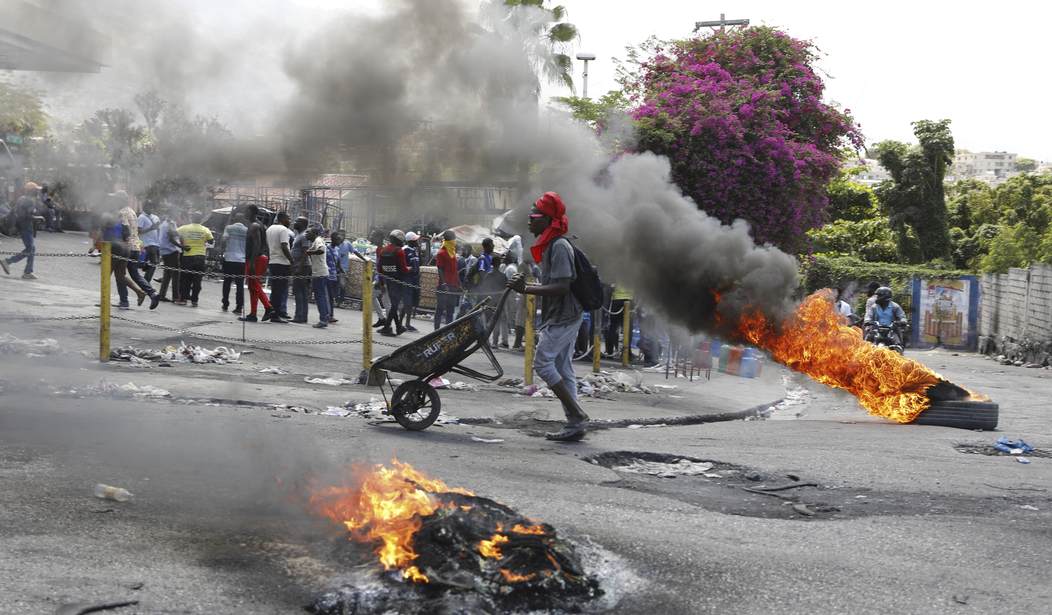The U.S. State Department choppered 15 Americans out of harm's way in the Haitian capital of Port-au-Prince as the situation in the gang-infested nation worsened.
The chopper took the Americans to the Dominican Republic on the other side of Hispaniola. At least 30 Americans will be evacuated daily, according to the State Department.
In addition, Florida Governor Ron DeSantis began evacuation flights for Florida residents who have been unable to leave after the gangs temporarily took over the airport. Commercial flight operations have nearly ceased and DeSantis predicted "many flights" sponsored by Florida to evacuate Americans.
“We are willing to dedicate the resources, we understand this is important, we understand that there’s people that are really in danger right now that are our fellow Floridians,” DeSantis said at a press conference in Central Florida.
DeSantis said that only Americans would be evacuated from Haiti and that the passengers wouldn't be charged for the flight. He said that many of the Americans looking to be evacuated went to Haiti to help deal with the crisis and ended up caught in the middle of gang violence.
DeSantis launched the flights after politically connected gangs overwhelmed Haiti with killings and kidnappings, relegating people to homelessness and the brink of famine. He also isn’t the only one to launch a rescue mission for people who cannot escape the violence. The State Department chartered a flight out of Haiti earlier this week carrying 30 U.S. citizens, and U.S. Rep. Cory Mills (R-Fla.) helped Americans evacuate Haiti two separate times in the past week, including people who’d been volunteering at orphanages.
Florida set up a portal online last week for people to ask for help, and as of 8 a.m. Wednesday, 300 Floridians have done so, said Kevin Guthrie, Florida’s emergency management executive director, at the press conference. He said he’d hoped to organize more flights Wednesday but added that it had been a “difficult and arduous process” in which he was “running into problem after problem” trying to work with the U.S. federal government to verify people’s identities.
“We reiterate our message to U.S. citizens: Do not travel to Haiti,” the State Department spokesman said. “U.S. citizens should depart Haiti when transportation options are available, and it is safe to do so.”
The gangs have raided jails, freeing up to 5,000 prisoners. Haiti's embattled Prime Minister Ariel Henry has agreed to step down but only after a "transitional council" has been named. The fractious group that's been tasked with naming the seven-member council has been plagued by resignations and threats of resignations. They've managed to name six of the seven members but can't agree on who the last member should be.
The transitional council will name a new prime minister and supposedly accept a multi-national police/military force headed by Kenya. The Kenyan Supreme Court recently ruled that Kenya couldn't send troops anywhere, so that UN-sponsored mission is up in the air.
“What the council is missing is a moral voice who can call for an end to the violence and madness,” said one of the people involved in negotiations. “It’s hard to be optimistic.”
The gangs have gone after a range of targets. Security forces thwarted attacks on the central bank and the airport. On Saturday, Unicef said one of its 17 shipping containers holding emergency maternal and child-care supplies was looted by gangs, which control Haiti’s main port.
Gangs also launched attacks on city sectors that had been considered relatively safe, such as the upscale Petionville district, where homes have been raided and shops looted.
In decades past, America would have sent troops to quell the violence and unrest. The rest of the world may pine for the days of American interventionism when Haiti devolves into a gangster state. Not this time.










Join the conversation as a VIP Member